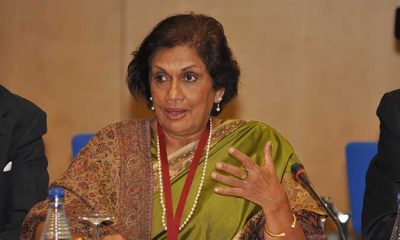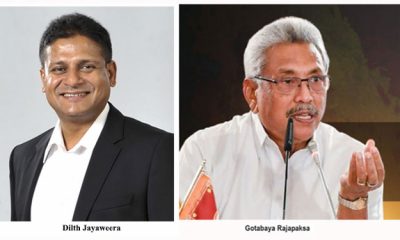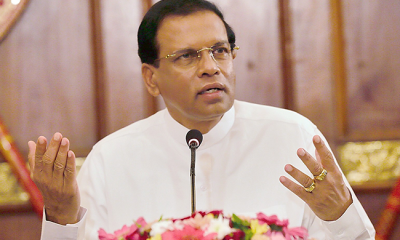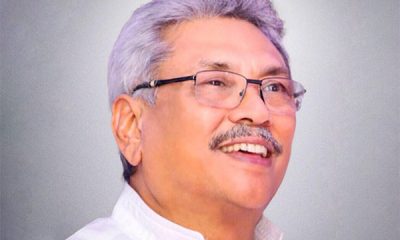Editorial
Gota’s return

There were reports on Friday morning as this is being written that former President Gotabaya Rajapaksa may be back in Sri Lanka over the weekend. No reasonable person will want to deny him his birthright of living here whatever the circumstances under which he ‘fled’ the country as has been stated ad infinitum since his departure. When he was forced to leave the country, caving into the massive ‘GotaGo’ demand, he did not find it easy to find a safe haven of refuge. It has been reported, though not confirmed, that he first explored the possibility of returning to the USA, whose citizenship he renounced, to run for president in Nov. 2019. Rajapaksa then as a dual citizen of Sri Lanka and the U.S. constrained by the then law from running for president while being a foreign citizen. Hence his renunciation of his U.S. citizenship.
When he was forced to depart, he first flew to the Maldives by military aircraft and within hours by a commercial flight to Singapore from where he resigned the presidency. The Singapore government which extended his original two week stay permit by two more weeks said on the public domain that GR was on a private visit and had not sought asylum. He had not been accorded facilities (perhaps other than security) or hospitality, an official statement from the Government of Singapore said. From the city state he flew to Thailand on a private charter and was confined to his hotel for reasons of security.
It has also been reported that he was exploring the possibility of returning to the United States where he had lived earlier following his premature retirement from the Sri Lanka Army holding the rank of lieutenant colonel. He returned to Sri Lanka following his brother’s election as president in 2005 and served as defence secretary until Mahinda Rajapaksa’s defeat in 2015, overseeing the end of the long war against the LTTE in 2009. He renounced his U.S. citizenship to run for president in 2019. Given his foreshortened tenure, he is reported to have explored the possibility of resuming U.S. residency. This, a former local employee of the U.S. Embassy in Colombo, now resident in the U.S. has said in a recent article, may not be easy for GR.
Although the former president renounced his U.S. citizenship, his wife retains her citizenship and his son and family live in that country. There may be reasons for allowing GR to return to the U.S. on grounds of family reunion. Also, as has been publicly pointed out, former presidents of Sri Lanka and their widows have several legal entitlements enjoyed by many of GR’s predecessors and their widows. He too would enjoy such entitlements. These include pensions, security, vehicles, residences and possibly staff. Mrs. Hema Premadasa, President Ranil Wickremesinghe noted in Parliament recently, is enjoying these benefits. So is former President Chandrika Kumaratunga who has accused President Mahinda Rajapaksa of attempting to, or actually doing her down. Former President Maithripala Sirisena, since his departure from office, continued to live in two government bungalows joined together as a presidential residence during his tenure but vacated those premises following a court order.
Although the actual date has not been set as this is being written, the former president is very likely be back in Sri Lanka in the short term. This has been discussed and facilitation requested by the SLPP. President Wickremesinghe, not long ago, expressed an opinion that the time was not right for Gota’s return. There is no doubt that the former president’s security, particularly, must be ensured. That is an obligation of the state. Like Presidents Jayewardene and Premadasa before him, GR chose to live in his private home at Mirihana rather than in President’s House for most of his tenure. Readers would remember that the Aragalaya gained momentum following an attack on this house, going beyond non-violent protest as was the case earlier. Although Rajapaksa as defence secretary lived in a government bungalow equipped with a giant tank in which sharks swam, he chose to continue living in his modest home as president. Once he is back, this may not be a suitable place for him to live on grounds of security considerations. His army pension too would be modest.
We do not know whether former Presidents Mahinda Rajapaksa and Maithripala Sirisena who continue in active politics as MPs, draw their presidential pensions in addition to their parliamentary emoluments. These, of course, would be entitlements. What we do know is there is massive adverse public opinion in the country about how our legislators look after themselves as incumbents and former incumbents. An MP, for example, is entitled to a life pension after a mere five years service in the legislature. Their widows/spouses continue to receive this benefit after their demise. Unlike the Widows and Orphans Pension in the public service, these benefits that parliamentarians enjoy are non-contributory. A magnificent gesture by two former Central Bank Governors, Mr. Sunil Mendis and Dr. Indrajit Coomaraswamy declining their pension entitlements was recently reported. But such gestures are all too rare in this country. In fact it was a self-serving maneuver in the Central Bank that created the entitlement that has been declined. It will be good to know whether former Governor Arjuna Mahendran, accused of culpability for the bond scams during the Yahapalanaya regime, is being paid a pension under the new rules despite his refusal to come back and face due process.
Editorial
Hurtful propaganda

Wednesday 7th May, 2025
Smearing opponents has become the dominant form of electioneering in Sri Lanka. All political parties unflinchingly resort to mud-slinging during election campaigns, and they are quite adept at making lies indistinguishable from the truth. They float various claims and counterclaims, and leave the public confused and unable to make informed decisions in elections.
One of former President Ranil Wickremesinghe’s close aides, Thusitha Halloluwa, created quite a stir on the eve of Tuesday’s local government polls. He levelled a very serious allegation against President Anura Kumara Dissanayake himself; Dissanayake had made a questionable investment in Greece while calling the Opposition politicians corrupt, he said.
The government let out a howl of protest, and lost no time in reporting Halloluwa to the CID, which amply demonstrated its selective efficiency once again by launching a prompt investigation into the NPP’s complaint. Halloluwa has been summoned to the CID. Having claimed that he has irrefutable evidence to support his claim, he will have to disclose it when he visits the CID today. Will the CID act in a similar manner if complaints are made against the government politicians that they have made statements derogatory of Opposition politicians?
Unsubstantiated allegations against key opposition figures formed a central pillar of the NPP’s election platform. Some NPP politicians claimed that the Rajapaksa family had stashed away billions of dollars in Uganda, and asked for a mandate to bring the stolen money back. Later, one of the NPP MPs who propagated that claim admitted that she had told the public a lie, and argued that anyone had a right to lie! The NPP carried out such propaganda attacks on its political rivals relentlessly, and the media gave them wide publicity, helping it turn public opinion in its favour. What if the Opposition politicians also make complaints to the CID that the NPP made false allegations against them?
Some NPP notables even made complaints to the CID about an alleged conspiracy to tarnish their reputation; they claimed that the Opposition was employing devious methods to have the public believe that they were falsely claiming academic titles. It is doubtful whether the CID has any time left for its regular duties and functions after it investigates government leaders’ complaints against their opponents.
Hardly a day passes without an underworld killing being reported. On Monday, a gunman killed a youth in what resembled a scene from a 1920s Chicago gangster film. CCTV footage shows the victim running away after being shot twice, in Mount Lavinia, and the gunman running after him and shooting him at close range on the Galle Road. These killings show how bold crime syndicates and their death squads have become of late. The police and the CID are apparently not up to the task of neutralising the nether world of narcotics and crime. So, it is hoped that the police will concentrate more on their operations against organised criminal gangs while investigating complaints from government politicians.
The police set up a special unit called the FCID (Financial Crimes Investigation Division) to probe allegations of corruption against the political opponents of the UNP-led Yahapalana government, which the JVP also backed. Given the sheer amount of political work the CID has to handle at present, it looks as if the police had to set up a special unit to probe complaints from the ruling party members so that the CID can devote more time to criminal investigations. That unit can be called the PCID (Political Complaints Investigation Division).
Some media rights groups have expressed serious concern about reports that the government is contemplating legal action against the media outfits that carried Halloluwa’s claim. One of the main reasons why the NPP succeeded in winning elections was wide media coverage of its unsubstantiated allegations against its rivals. So, the question is whether the NPP, which came to power, with the help of social media and a section of the mainstream media, has any moral right to institute legal action against the media for relaying unproven allegations.
Editorial
An election day thought

Tuesday 6th May, 2025
Elections to 339 local government (LG) institutions are set to take place today––at long last. The terms of the local councils, which were last elected in 2018, lapsed in 2022, but the then SLPP government extended them by one year. In 2023, President Ranil Wickremesinghe derailed the LG polls by refusing to allocate funds. A legal battle resulted in the Supreme Court ordering, last year, that the LG elections be held soon.
As many as 75,589 candidates are vying for 8,287 seats in local councils; there are 4,877 wards in all LG institutions. Having campaigned really hard, the main political parties claim to be confident of victory, but many councils are likely to be hung.
The LG polls are held under the mixed proportional system—60% of the councillors are elected on the ward basis under the first-past-the-post system; others are elected under the Proportional Representation system. The new electoral system has led to a two-fold increase in the number of local council members.
Sri Lanka has too many politicians and state employees, as is public knowledge. It is popularly said in this country that ‘if one kicks a wayside bush at random, more than a dozen politicians and state employees will jump out’. The ratio of state employees to citizens is 1:15. There are 225 MPs, 455 provincial councillors, and about 8,287 local council members. There is no fixed number of LG members; the number tends to increase due to the new electoral system, which allows for overhang seats––the LG members elected on the ward basis from a political party or an independent group in excess of its entitlement under the PR system.
It does not make sense to maintain so many elected people’s representatives at the national, provincial and grassroots levels.
The National List (NL), which provides for the appointment of 29 MPs on the basis of political parties’ or independent groups’ shares of the nationwide votes in parliamentary polls, has been abused all these years to appoint defeated candidates and others to Parliament. Some NL appointments even undermine the Constitution; political parties craftily use Section 64 (5) of the Parliamentary Elections Act No 1 of 1981, as amended in 1988, to fill NL vacancies which are engineered, in most cases, to circumvent Article 99A of the Constitution; thus, the persons of party leaders’ choice are appointed to Parliament via the NL. This sordid practice has severely eroded public trust in the electoral process. Successive governments have not cared to amend the Parliamentary Elections Act and the Constitution to prevent defeated candidates and others from being appointed as NL MPs, and therefore the NL mechanism should be done away with.
The Provincial Council (PC) system has become a white elephant, but successive governments have considered it a fait accompli due to Indian pressure. All nine PCs have functioned without elected representatives since 2017! Even the JVP, which is currently in power, as the main constituent of the NPP coalition, has bitten the bullet and chosen to ensure the perpetuation of the PC system, which it went all out to sabotage, albeit in vain, by unleashing mindless terror and destroying lives, in the late 1980s. Serious thought should be given to reducing the number of PC members.
The number of LG members must also be reduced drastically. Many local council wards can be merged, especially in urban areas.
There have been campaigns for controlling the populations of crop-raiding wild animals, such as monkeys. Curiously, no such effort has ever been made to reduce the number of people’s elected representatives, who cause far worse damage to the economy than all crop-depredating wildlife combined. The same goes for the ever-burgeoning public service, which has become a metaphor for inefficiency.
As for today’s election, every vote counts. Happy voting!
Editorial
Polls and power

Monday 5th May, 2025
The Election Commission (EC) has said that everything is ready for tomorrow’s local government (LG) polls. However, a trade union representing the Grama Niladharis (GNs), who play a crucial role in conducting elections, has complained that funds allocated for hiring generators to ensure an emergency power supply to counting centres, etc., are inadequate, and therefore those places may be left without back-up power systems tomorrow.
The GNs should not be held responsible if anything untoward happens in case of blackouts either due to technical defects or sabotage tomorrow, President of the United Grama Niladharis’ Association, Nanadana Ranasinghe, is reported to have said, demanding an explanation from the authorities concerned as to how such an emergency will be handled. He has asked whether they will use emergency lamps, candles or pandam (flambeaux) in the event of a power failure.
It is hoped that the government will not launch a witch-hunt against the GNs, and that the EC, etc., will act swiftly to solve the aforesaid problem. Nothing is so certain as power failures in this country, which experienced a countrywide power outage about three months ago.
We have witnessed numerous instances where governments led by the UNP and the SLFP resorted to barbaric violence and large-scale vote rigging to win elections; presidential polls in 1982 and 1988, under President J. R. Jayewardene’s watch, the 1989 parliamentary election under R. Premadasa’s presidency, and the 1999 North-Western Provincial Council election during President Chandrika Bandaranaike’s tenure stand out among them. The JVP has a history of trying to sabotage elections by unleashing mindless terror. In fact, it was the JVP’s terror campaign that enabled the then ruling UNP to stuff ballot boxes and win elections in 1988 and 1989.
Given Sri Lankan politicians’ tendency to manipulate elections, the possibility of governments resorting to electoral frauds to retain their hold on power in the future cannot be ruled out. Hence the pressing need for the EC to ensure that nothing is left to chance in its efforts to ensure free and fair elections.
One may recall that a power failure helped the UNP win a fiercely contested election in the early 1980s. President Jayewardene scrapped a general election which was due in 1982, for fear of losing his five-sixths majority in Parliament; he held a heavily-rigged referendum instead, undertaking to hold by-elections in the electorates where his government would lose. He had to hold 18 such by-elections in 1983; four of them were won by the Opposition in spite of large-scale rigging and violence unleashed by the UNP. Dinesh Gunawardena, Anil Moonesinghe, Richard Pathirana and Amarasiri Dodangoda won the Maharagama, Matugama, Akmeemana and Baddegama electorates, respectively. Violence and rigging enabled the UNP to win the other electorates, especially Mahara.
In Mahara, at the conclusion of the first round of counting, it became clear that SLFP candidate Vijaya Kumaratunga had won, but the UNP insisted on recounts, and then there occurred a blackout. When power was restored, UNP candidate Kamalawarna Jayakody had beaten Kumaratunga! The Opposition counting agents claimed that some election officials loyal to the UNP had literally swallowed dozens of votes polled by Vijaya, who had survived an attempt by the UNP to kill him in the run-up to the election.
Sri Lanka is no stranger to election malpractices although it has been free from them for some time. Anything is possible in high-stakes elections. It may be recalled that in 2020, the then US President Donald Trump claimed that his rivals had stolen America’s presidential election and engineered his defeat. So, a country like Sri Lanka has to take all possible precautions to ensure free and fair elections. Reliable back-up power systems must be available at all counting centres tomorrow.
History has a remarkable ability to repeat itself even after prolonged lapses; therein lies the rub. In a democracy, the integrity of elections must not be taken for granted. Constant vigilance is said to be the price of freedom.
-

 News6 days ago
News6 days agoRanil’s Chief Security Officer transferred to KKS
-

 Opinion4 days ago
Opinion4 days agoRemembering Dr. Samuel Mathew: A Heart that Healed Countless Lives
-

 Business2 days ago
Business2 days agoAitken Spence Travels continues its leadership as the only Travelife-Certified DMC in Sri Lanka
-

 Features7 days ago
Features7 days agoThe Broken Promise of the Lankan Cinema: Asoka & Swarna’s Thrilling-Melodrama – Part IV
-

 News7 days ago
News7 days agoRadisson Blu Hotel, Galadari Colombo appoints Marko Janssen as General Manager
-

 Business2 days ago
Business2 days agoLinearSix and InsureMO® expand partnership
-

 Business6 days ago
Business6 days agoCCPI in April 2025 signals a further easing of deflationary conditions
-

 Features7 days ago
Features7 days agoA piece of home at Sri Lankan Musical Night in Dubai






















